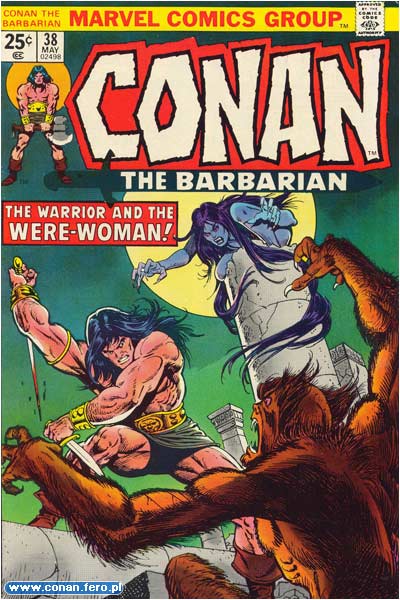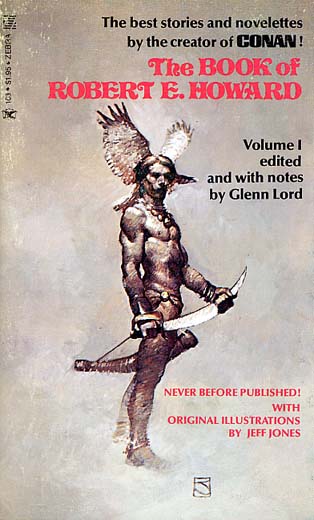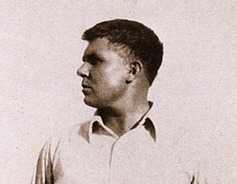The Were-woman and the Zebra
Friday, January 22, 2010
posted by Deuce Richardson
 Print This Post
Print This Post
I first read the name “Robert E. Howard” in the spring of 1975. I had seen a  copy of Marvel’s Conan the Barbarian #38 on a spindle-rack in one of those little corner grocery stores whose place has now been taken by stores of convenience in America’s small towns. Having discovered the works of Edgar Rice Burroughs the previous year, I was primed for the sort of adventure the cover seemed to promise. My indulgent and sainted grand-mother, responding as she nearly always did to my boyish entreaties, promptly bought it for me (naked blue chick and all).
copy of Marvel’s Conan the Barbarian #38 on a spindle-rack in one of those little corner grocery stores whose place has now been taken by stores of convenience in America’s small towns. Having discovered the works of Edgar Rice Burroughs the previous year, I was primed for the sort of adventure the cover seemed to promise. My indulgent and sainted grand-mother, responding as she nearly always did to my boyish entreaties, promptly bought it for me (naked blue chick and all).
Conan #38 was Roy Thomas’ (and John Buscema’s) adaptation of Robert E. Howard’s “The House of Arabu.” Howard’s yarn featured a blonde-haired Argive named Pyrrhas as the protagonist and was set during the twilight years of Sumer. Roy, as he often did with other REH tales, “freely adapted” (his own words, right on the splash page) the yarn as a story of Conan during his time in Turan, which he entitled, “The Warrior and the Were-Woman!”. Over the years, it’s been noted more than once that “Arabu” is one of Howard’s darker tales of high adventure. In my opinion, Thomas managed to convey a lot of that while still toeing the line for the Comics Code.
That comic blew my young mind. I reread it three times that night. I can still see my grade-school self lying there on my bed. With each page, the desire to dwell on the dynamic artwork battled with the yearning to find out what thrills were hidden on the next page. However, the most important thing I did was to take serious note of the author whose name was emblazoned on the splash-page: Robert E. Howard. It was time to hunt down his works. Time to search out the fountainhead.
My home-town library boasted a fairly impressive collection of the works of Edgar Rice Burroughs. However, there was not one single yarn by REH to be found within its walls. There was not, nor had ever been, a bookstore in my town. The Internet was well over a decade away. So, I bided my time and saved my very meager allowance money.
My big break came from a most unlikely event: a visit to the dentist’s office. While all my friends dreaded such excursions, I actively looked forward to mine. Blessed with good dentition (still no cavities), the time spent getting my teeth looked at was a small price to pay for being able to stalk the aisles of the bookstores of Joplin, Missouri.
On a shelf in a Walden’s bookstore, I found a copy of The Book of Robert E. Howard. I grabbed it, threw my hoarded quarters at the clerk and was out the door. A life-long fascination for the works of Robert E. Howard was about to begin.
I bought The Book of Robert E. Howard during a very special window of time in the publishing history of REH’s works. The success of the Lancer Conans had created an audience for the works of Howard, including the launch of the Marvel comic which I had bought. However, Lancer Books had gone into receivership a few years earlier. Thus, there were no Conan volumes on the bookracks, not even editions adulterated by L. Sprague de Camp.
While Sprague and the Mafia-backed lawyers of Lancer were wrangling, Glenn Lord got moving. He negotiated with Zebra Books to publish the majority of REH’s fiction not entangled in the Lancer legal morass. Zebra agreed to reprint in paperback several of the Howard hardcovers already published by small presses like Donald M. Grant and FAX. In addition, they commissioned two “best of” volumes from Lord, both of which would include heretofore-unseen works by REH. I held the first of the pair in my hand that day in Joplin.
The Book of Robert E. Howard had an irrevocable effect upon me. Sword-and-Sorcery, humorous and serious westerns, boxing yarns, historical adventure, horror, poetry — nearly all of the genres that REH turned his hand to were represented. To me, everything between those Jeff Jones covers kicked ass. I was so young, my definition of “cool” hadn’t solidified to the point where “categories” meant much. I just knew that the yarns and the poems rocked, and I knew that Robert E. Howard wrote them. Thanks to Glenn Lord, I got to read REH displaying his full spectrum of talents from the get-go.
Thank you, Grandma. Thanks, Roy. Thanks, Glenn. Most of all, thank you, Robert E. Howard (and happy birthday).


